 Petzlover
Petzlover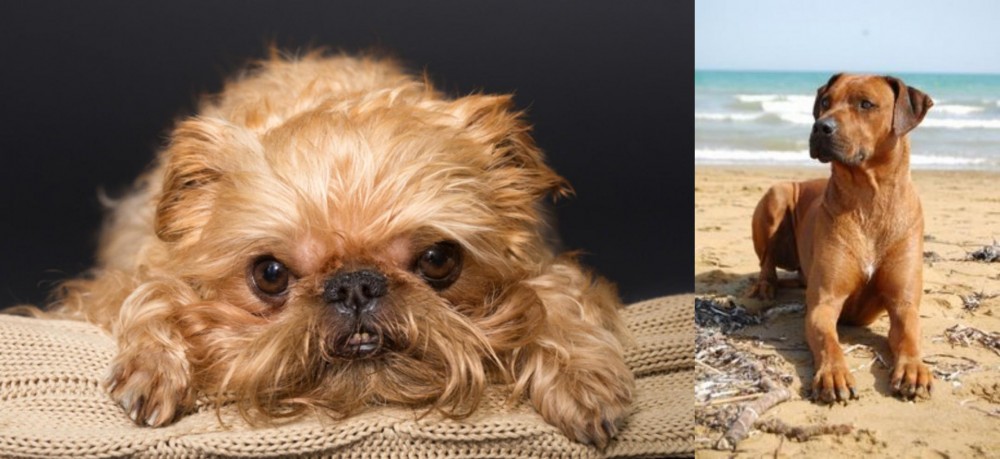 Brug is originated from United States but Rhodesian Ridgeback is originated from Zimbabwe. Brug may grow 23 cm / 9 inches shorter than Rhodesian Ridgeback. Brug may weigh 30 kg / 66 pounds lesser than Rhodesian Ridgeback. Both Brug and Rhodesian Ridgeback has almost same life span. Brug may have less litter size than Rhodesian Ridgeback. Brug requires High Maintenance. But Rhodesian Ridgeback requires Low Maintenance
Brug is originated from United States but Rhodesian Ridgeback is originated from Zimbabwe. Brug may grow 23 cm / 9 inches shorter than Rhodesian Ridgeback. Brug may weigh 30 kg / 66 pounds lesser than Rhodesian Ridgeback. Both Brug and Rhodesian Ridgeback has almost same life span. Brug may have less litter size than Rhodesian Ridgeback. Brug requires High Maintenance. But Rhodesian Ridgeback requires Low Maintenance
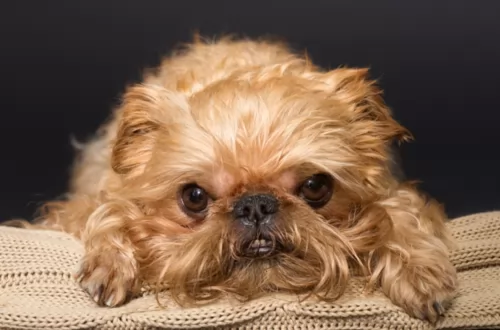 The Brug or Griffon Pug is not a purebred dog at this point in time. It is a cross between a Pug and a Brussels Griffon, currently known as a “designer dog” or a hybrid. This hybrid is really rare at this time but growing in popularity and breeders. Its exact history or original development is unknown at this time and needs to be researched as the hybrid develops into a breed, or breed clubs are formed. If you like either of the two breeds involved, you are sure to like the Brug. They are obviously not recognized by the major kennel clubs, but they are registered with a variety of hybrid/designer dog clubs. These include:
The Brug or Griffon Pug is not a purebred dog at this point in time. It is a cross between a Pug and a Brussels Griffon, currently known as a “designer dog” or a hybrid. This hybrid is really rare at this time but growing in popularity and breeders. Its exact history or original development is unknown at this time and needs to be researched as the hybrid develops into a breed, or breed clubs are formed. If you like either of the two breeds involved, you are sure to like the Brug. They are obviously not recognized by the major kennel clubs, but they are registered with a variety of hybrid/designer dog clubs. These include:
 Known as the African Lion Dog, the courageous Rhodesian Ridgeback hails from Rhodesia, now Zimbabwe.
Known as the African Lion Dog, the courageous Rhodesian Ridgeback hails from Rhodesia, now Zimbabwe.
He was bred essentially to be a hunter as well as a home guardian. These dogs were crossed with European dogs, with the original breed standard being drafted by F.R. Barnes By the 1860s, European colonisers had imported certain European dog breeds to the area such as Greyhound, Terriers, Bloodhounds as well as other breeds. These were mixed with the indigenous African dogs.
The Ridgeback Club was also founded. It was in 1955 that the American Kennel Club recognized the dog as a member of the Hound group.
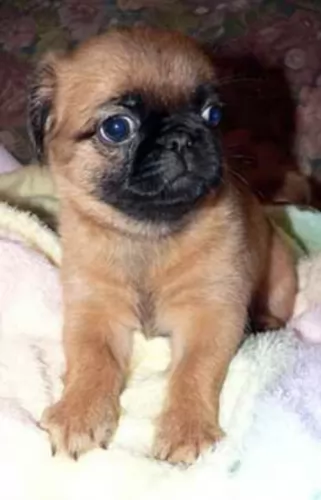 Like its two parental breeds, the Brug is a smaller sized dog – both parents are lab dogs and so is the Brug. Because they are hybrids, Brugs can be very different in appearance but most seem to have large eyes, squishy faces, black masks, fluffy hair, long black whiskers, short fluffy hair, flat ears and a fluffy tail. They could be in any of a number of colors including fawn, black, cream or apricot.
Like its two parental breeds, the Brug is a smaller sized dog – both parents are lab dogs and so is the Brug. Because they are hybrids, Brugs can be very different in appearance but most seem to have large eyes, squishy faces, black masks, fluffy hair, long black whiskers, short fluffy hair, flat ears and a fluffy tail. They could be in any of a number of colors including fawn, black, cream or apricot.
 Perhaps the most noticeable thing with this large, handsome formidable looking dog is the ridge of hair that runs along his back and gives him his name. The rest of the coat is short and smooth and can be a reddish tan color or wheaten shade.
Perhaps the most noticeable thing with this large, handsome formidable looking dog is the ridge of hair that runs along his back and gives him his name. The rest of the coat is short and smooth and can be a reddish tan color or wheaten shade.
He is a slender, athletic dog with an alert, intelligent face. The ears of the dog are floppy and carried close to the head, being broad and then narrowing to a rounded ear. The tail is long,broad at the base and tapers. He is a large dog that stands at between 61 and 69cm and weighs between 29 and 41kg.
In spite of his athletic build, he isn’t an overly active dog like many other breeds but will require a walk ever day as well as ball- and rope games.
He is a quiet, gentle dog, strong and confident, while also being strong willed and independent. He is tolerant around children, but isn’t the kind of dog that relishes being around little kids who try to climb over him.
He is smart and can be easily trained. Training and socialization turn him into an awesome pet.
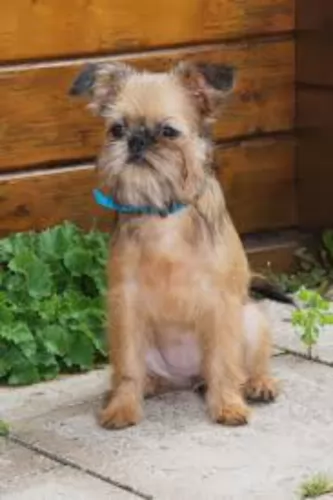 This hybrid is a loyal little dog. They are an affectionate lap dog that wants to be with his humans all the time. They have a very pleasant disposition and do well with children and other dogs. They might be shy to begin with but will warm up to affection. However, they are willful and self-important at times. This is tempered by their great sense of humor and empathy to its peoples’ moods. Left alone too long, they will tend to bark excessively.
This hybrid is a loyal little dog. They are an affectionate lap dog that wants to be with his humans all the time. They have a very pleasant disposition and do well with children and other dogs. They might be shy to begin with but will warm up to affection. However, they are willful and self-important at times. This is tempered by their great sense of humor and empathy to its peoples’ moods. Left alone too long, they will tend to bark excessively.
 Your Ridgeback is a dignified dog who is devoted to his human family, being aloof around strangers.
Your Ridgeback is a dignified dog who is devoted to his human family, being aloof around strangers.
He is a territorial dog and takes his job as guard dog seriously. He is confident and independent, and with his good looks, his loyalty and devotion, he is guaranteed to make you a most splendid pet and companion.
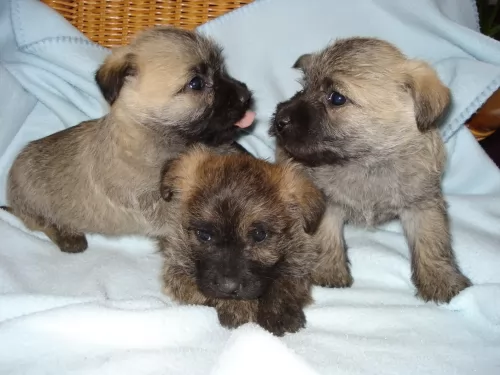 Usually the hybrid dog can have better health than either of the parents. This is true with the Brug as well, but there are also some issues they may inherit from the parents or face simply because of their size and complexion. These include:
Usually the hybrid dog can have better health than either of the parents. This is true with the Brug as well, but there are also some issues they may inherit from the parents or face simply because of their size and complexion. These include:
 Rhodesian Ridgebacks are generally healthy, robust dogs, but like with all breeds, they can also have their share of some of the common dog illnesses there are.
Rhodesian Ridgebacks are generally healthy, robust dogs, but like with all breeds, they can also have their share of some of the common dog illnesses there are.
If you’re buying a puppy, make sure it comes from a good breeder.
This is a hereditary disease which can become worse because of environmental factors such as rapid growth. The thighbone doesn’t fit properly into the hip joint.
It is sad when you see such a strong dog succumbing to hip dysplasia as it can cause a lot of pain and also make your dog lame. Arthritis can also occur.
For such a life threatening illness with a dog, it is wise to familiarize yourself with an emergency vet in your area. A dog with bloat needs to be rushed to the vet as soon as possible.
That is why it is better to feed your pet smaller meals daily rather than one big meal. Bloat is an ailment where there is rapid accumulation of gas in the stomach.
Dogs with deep chests are at a greater risk of bloat. Typical symptoms of bloat include restlessness, a swollen, hard stomach and trying to vomit.
Canine bloat or gastric dilatation and volvulus is a killer with dogs, with the gas accumulation causing the stomach to twist.
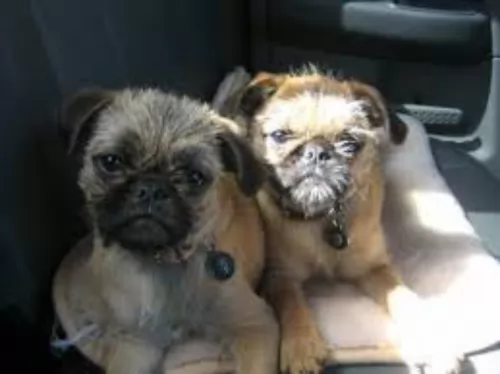 Don’t let this dog get overweight. Feed a high quality dry food intended for small or toy dogs. One fourth to one half of a cup per day in two separate meals is what is recommended.
Don’t let this dog get overweight. Feed a high quality dry food intended for small or toy dogs. One fourth to one half of a cup per day in two separate meals is what is recommended.
Patella Luxation or slipped knee caps – small dogs often have this issue. The patella is the knee cap and layman often called it a slipped knee cap, but it is also called slipped stifles. The femur, the tibia and the patella do not line up and this causes an abnormal gait or even lameness. Puppies are born with this, but it does not exhibit symptoms until years later. Arthritis is the most common result. Occasionally surgery is required.
Eye Issues – Cherry eye, a genetic disease, as well as irritation from air borne particles, allergies or scratches.
Skin Allergies – They can have skin allergies so watch for excessive licking or scratching.
Breathing Issues – Asthma and respiratory issues are common among small dogs with these types of faces.
Like their 2 breed parents, the Brug is a small but energetic hybrid. They need to play and run on a daily basis. Leash walks are good, but they need a yard or dog park as well. They are athletic little dogs and are good at tracking, obedience and agility. You cannot force them to do an activity but if its fun they will jump right in.
 The Rhodesian Ridgeback only sheds a little so you can keep him looking good with a brush twice a week.The shiny coat can be maintained by wiping him down with a damp cloth. Look out for any unusual lumps you might find.
The Rhodesian Ridgeback only sheds a little so you can keep him looking good with a brush twice a week.The shiny coat can be maintained by wiping him down with a damp cloth. Look out for any unusual lumps you might find.
He has floppy ears so during your grooming session check inside his ears and make sure they aren’t red. You can suspect an ear infection when you see your Ridgeback shaking his head or scratching his ears.
Check inside your Ridgeback’s mouth too as dogs can’t tell you when they’ve got a rotten tooth that is causing terrible pain and also poisoning their entire system.
Trim his nails too if they don’t wear down naturally.
Your large Rhodesian Ridgeback will need good food from you if you want to have less visits to the vet because of illness.
If you have a puppy feed him 4 bowls of food a day, but once your dog is one year of age he can have two bowls of food. Two bowls are better than one as with one bowl, your dog becomes ravenous and gobble his food down. This can lead to bloat.
It is always convenient to feed him one of the top quality commercially manufactured dog foods but he will also need some tasty home-made food too. Boiled chicken, brown rice or pasta and spinach, sweet potatoes and carrots are a healthy choice for your pet – plain and simple dog food, just like dogs want.
They don’t want exotic, spicy foods that humans eat as it upsets their stomach. Chop this home-made food up ad put it into his dry kibble twice a week for a treat. Also try to give him a bit of raw meat occasionally. Never leave him without a constant source of fresh, cool water.